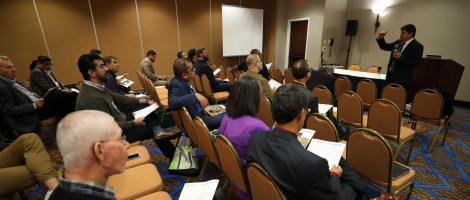Cross-cultural, cross-generational communication in Hispanic churches
by Lauren Hollon Sturdy on November 13, 2017 in News

The United States has the second largest Hispanic population of any country in the world. This represents a huge opportunity for Texas Baptists in particular, said Rolando Rodriguez, director of Hispanic Ministries, in his Monday morning workshop at the 2017 Texas Baptists Annual Meeting.
In the session, “Preaching to Reach Hispanics in Texas,” Rodriguez said the biggest challenge is finding ways to minister effectively to the diverse generations within the Hispanic community.
The first generation was born outside the United States and Spanish is used in the home most of the time. This generation tends to be very traditional and conservative.
The second generation is the “bridge” group. They are bicultural, bilingual and “get the best of both worlds.”
The third generation typically becomes fully assimilated. If they aren’t careful, they will lose their Spanish completely. They tend to be less formal than the first generation.
The workshop focused primarily on how to work with the first and second generations, and how to handle language barriers in preaching. Respect and family are the two primary cultural drivers. Understanding these is essential to a successful cross-generational Hispanic ministry.
Rodriguez said respect for authority is important, particularly for those coming from a Roman Catholic background. He said he almost never visited his priest’s office growing up, so the ability to meet with a pastor individually is a big change for more traditional families. He noted it’s important to maintain formality when working with traditional Hispanic church members.
“Rethink how you dress when visiting your members,” Rodriguez advised. “This is why we still tend to preach in suits. It’s also important to the first and second generations to use the titles Pastor, Hermano or Hermana when addressing people. If you were to come to my church and address me by my first name, you’d offend a lot of my congregation.”
Besides respect, family is the most important cultural value. Mainstream American culture is very individualistic, while Hispanic culture is more like the Three Musketeers: “All for one and one for all.”
“If you truly care to connect with someone and reach them, you must ask about their family first before discussing any other topics,” Rodriguez said.
Rodriguez turned the conversation over to a panel of Hispanic pastors to discuss specifics of communicating in a bilingual and multicultural context.
Pastor Carlos Alsina of West Side Baptist Church in Seguin said it’s important to be inclusive in preaching.
“When I came to Texas, I switched from using the King James Version to the NIV,” Alsina said. “Use a common language. When preaching, I immediately talk about the meaning of any words that could be complicated, because the same word could mean different things to Spanish speakers who come from different parts of Mexico or different countries.”
Pastor Oliver Martinez of Iglesia Bautista Getsemani in Fort Worth said their bilingual service is a good compromise.
“We have a diverse community of faith at my church and it’s hard to please everyone,” Martinez said. “We have bilingual preaching and bilingual music. It’s beautiful to see how they respond.”
Pastor Martin Ortega of Iglesia Bautista Emanuel in Midland has experience in two different ways of delivering sermons in two languages.
“My son translated for me for 10 years,” Ortega said. “The church loved it. Some were bilingual, so hearing the sermon in both Spanish and English strengthened their language skills. Now, on two Sundays each month, a preacher is preaching in English with a Spanish translator, and vice versa. We have four pastors and four translators on staff.”
Rodriguez pointed out that each church has to find the solution that works best for its members and its area.
Strengthening a multiplying movement of churches to live out the Great Commandment and Great Commission in Texas and beyond.
The ministry of Texas Baptists is made possible by giving through the Texas Baptists Cooperative Program, Mary Hill Davis Offering® for Texas Missions, Texas Baptists Worldwide and Texas Baptist Missions Foundation. Thank you for your faithful and generous support.
Subscribe to receive stories like this one directly to your inbox.
We are more together.
Read more articles in: News, Annual Meeting
More from Lauren Hollon Sturdy
- Challenging Texas Baptists to change the world by looking up
- Gregory discusses preaching to persuade
- Mancini challenges churches to dream big
- Robert Pinder, Bob Feather and First Baptist Belton honored by Texas Baptist Mission Foundation
- Hispanic Baptists worship, emphasize being compelled to action